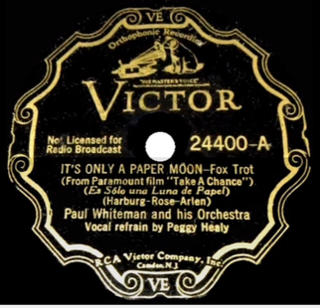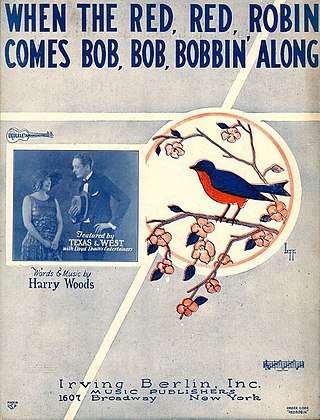Related Research Articles
"Hey There" is a show tune from the musical play The Pajama Game, written by Richard Adler and Jerry Ross. It was published in 1954. It was introduced by John Raitt in the original production. In the show, Sid sings it to a recording device, telling himself that he's foolish to continue his advances to Babe. He plays the tape back, and after responding to his own comments, sings a duet with himself.
"Blues in the Night" is a popular blues song which has become a pop standard and is generally considered to be part of the Great American Songbook. The music was written by Harold Arlen, the lyrics by Johnny Mercer, for a 1941 film begun with the working title Hot Nocturne, but finally released as Blues in the Night. The song is sung in the film by William Gillespie.
"All Alone" is a popular waltz ballad composed by Irving Berlin in 1924. It was interpolated into the Broadway show The Music Box Revue of 1924 where it was sung by Grace Moore and Oscar Shaw. Moore sat at one end of the stage under a tightly focused spotlight, singing it into a telephone, while Oscar Shaw sat at the other, doing the same.
"Do Nothing till You Hear from Me" is a song with music by Duke Ellington and lyrics by Bob Russell. It originated as a 1940 instrumental that was designed to highlight the playing of Ellington's lead trumpeter, Cootie Williams. Russell's words were added later. In 1944, Ellington's own recording of the song was a number one hit R&B chart for eight non-consecutive weeks and number six on the pop chart.
"Three Little Words" is a popular song with music by Harry Ruby and lyrics by Bert Kalmar, published in 1930.
"P.S. I Love You" is a popular song with music by Gordon Jenkins and lyrics by Johnny Mercer. published in 1934.
"Too Marvelous for Words" is a popular song written in 1937. Johnny Mercer wrote the lyrics for music composed by Richard Whiting. It was introduced by Wini Shaw and Ross Alexander in the 1937 Warner Brothers film Ready, Willing and Able, as well as used for a production number in a musical revue on Broadway. The song has become a pop and jazz standard and has been recorded by many artists.

"It's Only a Paper Moon" is a popular song published in 1933 with music by Harold Arlen and lyrics by Yip Harburg and Billy Rose.

"My Buddy" is a popular song with music written by Walter Donaldson, and lyrics by Gus Kahn. The song was published in 1922 and early popular versions were by Henry Burr (1922), Ernest Hare (1923) and Ben Bernie.
"Don't Take Your Love from Me" is a popular song written by Henry Nemo and published in 1941. Mildred Bailey first recorded this song in 1940 before publication. It was introduced that year by singer Joan Brooks.
"This Can't Be Love" is a show tune and a popular song from the 1938 Rodgers and Hart musical The Boys from Syracuse when it was sung by Eddie Albert and Marcy Westcott. The lyrics poke fun at the common depiction of love in popular songs as a host of malignant symptoms, saying, "This can't be love because I feel so well."
"Hello, Young Lovers" is a show tune from the 1951 Rodgers and Hammerstein musical, The King and I. It is sung by Anna, played by Gertrude Lawrence in the original Broadway production; by Valerie Hobson in the original London West End production; and by Deborah Kerr in the film version.
"It's Easy to Remember " is a popular song written by Richard Rodgers with lyrics by Lorenz Hart.
"I've Got The World on a String" is a 1932 popular jazz song composed by Harold Arlen, with lyrics written by Ted Koehler. It was written for the twenty-first edition of the Cotton Club series which opened on October 23, 1932, the first of the Cotton Club Parades.
"Moonlight Becomes You" is a popular song composed by Jimmy Van Heusen with lyrics by Johnny Burke. The song was written for the Paramount Pictures release Road to Morocco (1942) and published in 1942 in connection with the film. Vic Schoen wrote the arrangement.
"I Wished on the Moon" is a song composed by Ralph Rainger, with lyrics by Dorothy Parker. Bing Crosby sang the song in The Big Broadcast of 1936.
"My Shining Hour" is a song composed by Harold Arlen with lyrics by Johnny Mercer for the film The Sky's the Limit (1943). In the film, the song is sung by Fred Astaire and Sally Sweetland, who dubbed it for actress Joan Leslie. The orchestra was led by Freddie Slack. "My Shining Hour" was nominated for an Academy Award for Best Song but lost to "You'll Never Know".
"I Let a Song Go Out of My Heart" is a 1938 composition by Duke Ellington, with lyrics added by Irving Mills, Henry Nemo and John Redmond. The song became a number one hit for Ellington in 1938. Other hit versions the same year were by Benny Goodman, Connee Boswell, Hot Lips Page, and Mildred Bailey. It was performed as part of The Cotton Club Parade of 1938.
"What's New?" is a 1939 popular song composed by Bob Haggart, with lyrics by Johnny Burke. It was originally an instrumental tune titled "I'm Free" by Haggart in 1938, when Haggart was a member of Bob Crosby and His Orchestra. The tune was written with a trumpet solo, meant to showcase the talents of band-mate Billy Butterfield. Crosby's orchestra recorded "I'm Free" the same day it was written.

"When the Red, Red Robin " is a popular song written, both words and music, by Harry Woods in 1926. The song became the signature song for singer and actress Lillian Roth, who performed it often during the height of her musical career from the late 1920s to the late 1930s.
References
- ↑ Out of This World (1945) at IMDb
- ↑ Wilder, Alec (1990). American Popular Song. Oxford, New York: Oxford University Press.
- ↑ Whitburn, Joel (1986). Joel Whitburn's Pop Memories 1890-1954. Wisconsin, USA: Record Research Inc. p. 565. ISBN 0-89820-083-0.
- ↑ "A Bing Crosby Discography". BING magazine. International Club Crosby. Retrieved September 9, 2017.
- ↑ Whitburn, Joel (1986). Joel Whitburn's Pop Memories 1890-1954. Wisconsin, USA: Record Research Inc. p. 138. ISBN 0-89820-083-0.
- ↑ "Tina May – Fun: Overview". AllMusic. Retrieved April 1, 2022.
- ↑ "Sixteen Sunsets - Jane Ira Bloom | Songs, Reviews, Credits | AllMusic". AllMusic . Retrieved 21 July 2020.